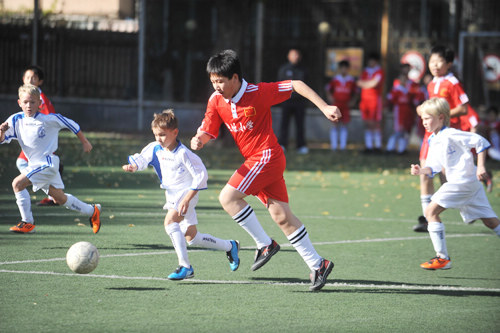|
 |
|
RUN, KICK, PLAY: A Beijing primary school soccer players competes against a Russian team. The Beijing team lost 0-15 (CFP) |
A primary school in Xi'an, northwest China's Shaanxi Province, recently demanded its students who do not perform well in school to wear green scarves rather than the red scarves, a symbol of the Young Pioneers of China, a mass youth organization for children aged 6 to 14 in the country. The school said the method is meant to encourage students to work harder and catch up with those who wear red scarves.
Shortly after that, a similar situation occurred in a middle school in Baotou, north China's Inner Mongolia Autonomous Region. The students whose scores ranked among the top 50 of the grade and were making progress in study were awarded distinctive red school uniforms, to separate them from ordinary students.
The two cities have stopped their ridiculous measures because of public opposition. Both cases reflect the simplistic and faulty thinking that academic performance is the only criteria to evaluate students. It is unequal treatment to students. As a result, young students may gradually develop improper values and outlooks on life. Any measures that divide students into different groups and label them good or bad should be banned in the future.
West China Metropolis Daily
Recently, football teams from Beijing's two primary schools were beaten by a visiting Russian primary school football team by 0-15 and 3-7.
It is reported that the Russian football team has undergone professional training, but Beijing's young football players were totally amateur lovers of the sport. The failures seem to be understandable. But the real problem is Chinese students' poor fitness. After 20 minutes' playing, Chinese students became exhausted and ran out of breath, a sharp contrast to the vigorous Russian children. This is not an individual case of Beijing's children, but the general situation around China. In the past 10 years, Chinese adolescents' health indexes have deteriorated, with the obesity rate surpassing that of developed countries and the poor vision rate for junior middle school students approaching 60 percent, senior middle school students 76 percent and college students almost 83 percent.
For years, an exam-oriented education system has forced schools and parents to impose as many books as possible on students, and all students are told the only thing that matters is to enter prestigious universities. Physical education classes are squeezed and sometimes cancelled. Parents are also neglecting children's physical exercise. They spend a lot of money on children's study, but seldom on children's physical development. The large margin of the football match scores is a warning to every teacher and parent in China.
People's Daily
A baby in Shenzhen, south China's Guangdong Province, was taken to Shenzhen Children's Hospital for treatment, and the hospital said the baby needed an operation that would cost tens of thousands of yuan. Later, the parents transferred the baby to another hospital which claimed that it would manage the disease and charge the parents less than 1 yuan ($0.15). The first hospital soon became a target of criticism, especially after massive media publicity.
But, in the second hospital, the baby's health began to deteriorate and the parents had to move it to a hospital in central China's Hubei Province, where the diagnosis and treatment were the same as the first hospital. The baby has recovered after a surgical operation in Hubei. The parents apologized to the first hospital.
We have to ask, what role did the media play in the whole thing? They kept escalating the conflict by writing prejudiced reports about the first hospital. The media believed the parents' words without checking and wronged the first hospital. The media were supposed to take an impartial attitude toward the matter and act prudently as objective bystanders. If they had given the first hospital a bigger voice, and kept alert to parents' exaggerated descriptions of issues, the media could have avoided the embarrassment of misreporting.
Every profession has its code of conduct, with no exception for the media. Journalists should not report based on their own imaginations, but should look at facts.
China Youth Daily
China's publishing industry is now booming. Readers are able to freely choose from numerous titles, and sometimes this makes it difficult for them to decide what to buy. Bestseller lists seem to be able to solve this problem. But it is said that booksellers manage to move their books to the top of these lists.
A bestseller list is both cultural and commercial, but by no means should its cultural nature be transformed. If there are commercial interests and hidden tactics in making best-seller lists, then such lists are nothing but advertisements, unqualified to guide the public's book shopping.
This problem demands a balance between cultural nature and commercial interests. On one hand, commercial interests are important; on the other hand, lists should continue to be reliable guidelines for shoppers. Nowadays, bestseller lists are more commercial and are increasingly becoming tools for publishers and booksellers to chase huge profits. Gradually, the public will not believe these lists.
As for book-related businessmen, it's better for them to spend more time in producing quality books than using trickery to increase sales. Books are not ordinary commodities. Selling books is doing business, but it also is spreading culture. Those who are involved in the business must not surrender cultural responsibility to commercial interests.
Yangcheng Evening News | 